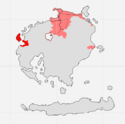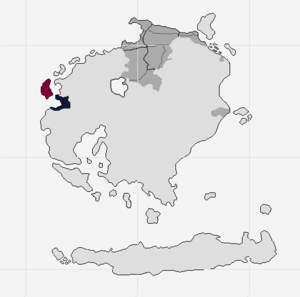Realm of Redwood-Brugge
| Realm of Redwood-Brugge Hed Ämäanaß del hed Ancíent aji Divï (The Meat of the Ancient and Divine) | |||
| |||

| |||
| Capital | Redwood City | ||
| Major cities | Redwood City, Brugge, Luxor City | ||
| Demonym | Lurkish | ||
| - Adjective | Lurkish, Lurkian, Lurkien | ||
| Area | 130,032 km² | ||
| - Ranked | |||
| Population | 1,070,383 (909 WG) | ||
| - Ranked | |||
| Density | 8.23/km² | ||
| Abbreviation | RB | ||
History

Located in the remote Western reaches of the Virtual, or Wild Nethers of Southern Corum, the Realm of Redwood-Brugge was established in the early 820s WG, as part of an agreement between the government of Passio-Corum and local rulers, which would allow for trade between the regions, specifically in regards to livestock. Here, ranchers raise herds of hundreds to thousands of Eeli-Illt-Eda, large, plated reptiles, who's meat is often preferred over the meat of other types of livestock, not only for its unusual tenderness or its particularly sweet and savory flavor, but also for its innate ability to be preserved for long periods of time. In response to high demand amongst consumers for the renowned meat of the eeli-illt-eda, and demand amongst prospective New Zimian and Bayanese ranchers who wished to gain access to domesticated herds of the beasts of burden, the government of Passio-Corum first laid claim to the joint settlement of Redwood-Brugge, in 31.44 PSSC.
Geography
Climate and Topography
| Climate V|Topography > | |||||
|---|---|---|---|---|---|
| Sea Level | Coastal Plains | High Plains | Highlands | Mountains | |
| Cfc | X | X | |||
| Dsd | X | X | |||
| Dwa | X | X | |||
| Dwb | X | X | |||
| Dwc | X | X | |||
| Dwd | X | X |
Demographics
Region Statistics
| Year | Population | Growth (Growth %) | Food Imports (/Person) | Fuel Imports (/Person) | Other Imports (/Person) | Immigration Modifier (%) | Seats in Regional Government | Seats in Houses of Corum
|
|---|---|---|---|---|---|---|---|---|
| 39.80 PSSC | 4,021,102 | 78 (0%) | 2,739,343 (.68) | 2,473,954 (.61) | 5,368,549 (1.33) | .38 | 40 | 161 |
| 39.60 PSSC | 4,021,024 | 15,908 (.4%) | 2,957,766 (.73) | 2,429,133 (.6) | 6,101,741 (1.51) | .35 | 40 | 161 |
| 39.40 PSSC | 4,005,116 | 44,974 (1.12%) | 3,448,475 (.86) | 2,367,571 (.59) | 7,103,683 (1.77) | .31 | 40 | 160 |
| 39.20 PSSC | 3,960,142 | 1,426,305 (36.02%) | 3,917,594 (.98) | 2,921,788 (.73) | 7,827,809 (1.97) | .27 | 40 | 158 |
| 39.00 PSSC | 2,533,837 | 79,972 (3.16%) | 2,442,085 (.96) | 4,427,698 (1.74) | 5,196,109 (2.05) | .21 | 25 | 101 |
| 38.80 PSSC | 2,453,865 | 10,426 (.42%) | 1,785,996 (.72) | 3,999,201 (1.62) | 3,303,190 (1.34) | .27 | 25 | 98 |
| 38.60 PSSC | 2,443,439 | -32,250 (-1.32%) | 2,069,706 (.84) | 3,249,096 (1.32) | 4,079,040 (1.66) | .26 | 24 | 98 |
| 38.40 PSSC | 2,475,690 | -40,880 (-1.65%) | 1,870,110 (.755) | 3,739,481 (1.51) | 3,912,294 (1.58) | .26 | 25 | 99 |
| 38.20 PSSC | 2,516,571 | 1,361,290 (54.09%) | 2,365,135 (.93) | 5,199,003 (2.06) | 5,018,718 (1.99) | .2 | 25 | 101 |
| 38.00 PSSC | 1,155,281 | 13,243 (1.15%) | 1,057,524 (.91) | 6,373,176 (5.51) | 1,456,081 (1.26) | .13 | 12 | 46 |
| 37.80 PSSC | 1,142,038 | -10,279 (-.9%) | 719,309 (.629) | 2,430,151 (2.12) | 3,568,410 (3.12) | .17 | 11 | 46 |
| 37.60 PSSC | 1,152,318 | -19,001 (-1.65%) | 597,183 (.518) | 1,940,800 (1.68) | 3,863,788 (3.35) | .18 | 12 | 46 |
| 37.40 PSSC | 1,171,320 | 21,168 (1.81%) | 568,862 (.48) | 2,321,165 (1.98) | 2,962,785 (2.52) | .2 | 12 | 47 |
| 37.20 PSSC | 1,150,152 | -21,964 (-1.91%) | 465,592 (.4) | 1,828,572 (1.58) | 2,931,271 (2.54) | .22 | 12 | 46 |
| 37.00 PSSC | 1,172,117 | 5,941 (.51%) | 468,002 (.399) | 1,722,347 (1.46) | 1,063,217 (.9) | .36 | 12 | 47 |
| 36.80 PSSC | 1,166,176 | -7,719 (-.66%) | 411,029 (.352) | 1,646,006 (1.41) | 782,949 (.67) | .41 | 12 | 47 |
| 36.60 PSSC | 1,173,896 | 11,534 (.98%) | 564,735 (.481) | 2,763,854 (2.35) | 211,008 (179) | .3 | 12 | 47 |
| 36.40 PSSC | 1,162,362 | -5,812 (-.5%) | 358,183 (.308) | 1,461,954 (1.257) | 124,169 (.106) | .43 | 12 | 46 |
| 36.20 PSSC | 1,168,175 | 76 (.01%) | 402,122 (.34) | 1,466,717 (1.25) | 140,570 (.12) | .37 | 12 | 47 |
| 36.00 PSSC | 1,168,099 | -13,329 (-1.14%) | 429,792 (.36) | 1,470,228 (1.25) | 173,687 (.15) | .4 | 12 | 47 |
| 35.80 PSSC | 1,181,429 | 2,560 (.22%) | 408,998 (.34) | 1,468,101 (1.24) | 142,431 (.12) | .45 | 12 | 47 |
| 35.60 PSSC | 1,178,869 | 40,109 (3.4%) | 435,897 (.36) | 1,785,824 (1.51) | 142,584 (.12) | .4 | 12 | 47 |
| 35.42 PSSC | 1,138,760 | 8,395 (.74%) | 374,141 (.32) | 1,147,389 (1) | 170,452 (.14) | .55 | 11 | 46 |
Transportation
The most popular mode of transportation in the Realm of Redwood-Brugge is sail. Insofar as most residents of the region do not own a personal sailing craft, travel between the mainland and the island of Brugge is typically carried out by ferry. With that said, rail is another common mode of transportation, especially for travelers not seeking to leave the mainland. Railways in the region are maintained by the Corumian Railway Corporation.
Military Installations
The Realm of Redwood-Brugge is home to Fort Luxor, the largest military base operated by the New Zimian War League in western Corum.
Protected Areas
While there are no formal protected areas within the borders of the Realm of Redwood-Brugge, the region's government has informally committed to protecting the independent city-state of Aiji from foreign or indigenous aggression.
Culture

Eelionian Culture
Eelionian Culture is the primary culture of the Gamesman people who inhabit the region surrounding the city of Brugge in western Corum. This culture, which first developed in the period following the collapse of Jamzinia, is defined by a pastoral lifestyle in which members earn their living by raising and selling the meat of the Eeli-Illt-Eda which are abundant in the region. The members of this culture, with this said, were the first people in Corum to domesticate Eeli-Illt-Eda.
Luxorian Culture
Luxorian Culture is the primary culture of the people who inhabit Middelburg Island, the largest island, and most significant trading port in western Corum. This culture has been shaped by the passage of goods and services between Corum and Eura. With that said, the culture represents a distinct blend of traditional and contemporary and Eurani and Corumian cultures. In terms of social customs, fashion, and architectural preferences, members of this culture share much in common with their trade partners across the Austral Strait. In terms of political dispositions and attitudes, members align more closely to the Bassarid and Gamesman cultures of northern and western Corum.
| |||||||||||
